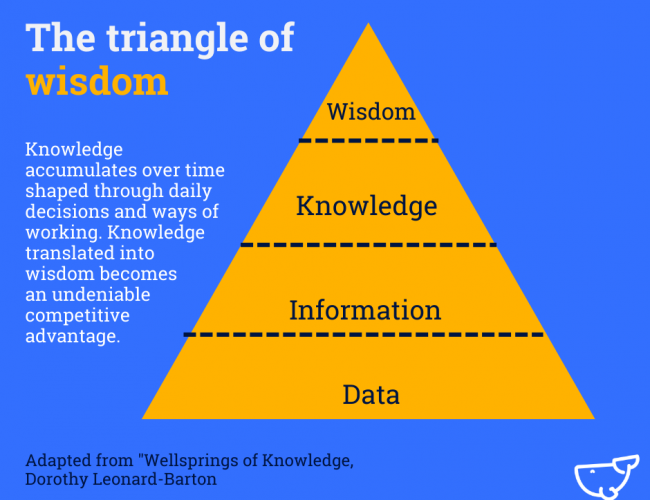What does knowledge transfer have to do with sport and training?
Well, if you ask any athlete, aspiring or professional, they will tell you that one of the keys to performance is how quickly you can recover after training.
The stronger the muscle🦵, the greater its capacity for added workload.
At first glance sport and entrepreneurship may seem worlds apart but it isn’t so. Both are performance-oriented and require stamina and strength to succeed.
The greater the stronger your knowledge ‘position’ within your organization, the greater your propensity to grow.
We recently spoke to process consultant and Founder and CEO of Business Success Consulting Group Adi Klevit to get her thoughts on why knowledge transfer matters.
But first, let’s define knowledge transfer
Okay so knowledge transfer is a powerful muscle but in order to make it stronger, let’s define what it is.
Let’s start with what knowledge transfer isn’t. It isn’t a static base of knowledge to train your team.
Knowledge transfer (and true knowledge sharing) starts with the premise of capturing and preserving critical information in your business.
It assumes that
✅ you know where the knowledge is,
✅ you know who knows it,
✅ and you have access to this information as and when you need it.
“Knowledge transfer is the practical problem of transferring knowledge from one part of the organization to another. It seeks to organize, create, capture, or distribute the “know-how” of the most expert in a field and ensure its availability for future stakeholders." (Howlett, Robert James, Innovation Through Knowledge Transfer.)
In simple terms, one of your organization’s biggest assets is the inordinate amount of information ℹ️ it owns; within its people and processes.
When knowledge transfer matters when...
Having your company knowledge document matters. It’s more than just ‘a nice to have’ to keep organized. It may have a significant impact on operating efficiency, business continuity, and bottom line.
Knowledge transfer matters:
When staff leave
Knowledge transfer matters when people leave the business. Imagine you have a team member who started the department or a team member who has very specific knowledge and is the ONLY one with access to that information.
When a key member of the team leaves, it’s devastating enough but when that person leaves and takes company information with them, it becomes a business risk.
Don’t think it’ll happen?
According to the Delloitte Global GenZ and Millenial study 2022:

On selling or exiting a business
Maybe one day you’d like to sell your business. Did you know that the more repeatable and scalable a business is, the more intrinsic value it has to investors?
Even if you don’t want to sell but you’d like to take a vacation or just work fewer hours, who’s going to take over? Are you the only one with access to specific knowledge?
You won’t be able to transfer knowledge unless it’s actually documented in specific procedures.
Not only will implementing a knowledge management process and platform make the business more valuable but it’ll probably save you, and your team, from burnout.
In decision making
“The main job of decision-makers in the knowledge-creating company is to orient this chaos towards purposeful knowledge creation” Nonaka (1991)
Ever wondered what to wear in the morning? And then thought about what to eat for lunch or dinner? At the same time as wondering how to tackle the next quarter’s targets?
It’s exhausting! 🥵
And as it turns out, decision fatigue is a thing.
“Decision fatigue is a state of mental overload that can impede our ability to make additional decisions”, The Washington Post.
So now what? Try to do fewer things? Often that isn’t a real solution. It’s more about creating systems that decrease (mental) exhaustion so as to leave energy for exciting challenges like brainstorming.
The more you can have knowledge documented and knowledge transfer happens, the fewer decisions will need to be made about repetitive, frequent, or specialist tasks and the more energy can be directed towards growth-oriented activities.
To promote innovation
By providing a structured approach to knowledge transfer through SOPs and a knowledge management platform, companies can identify strategic gaps and weaknesses. It could even be the pathway to innovation.
Identifying knowledge gaps can provide an opportunity for the organization and team members to find new ways of operating and new opportunities.
BUT you can only find gaps when you have a base to work from which is why it’s important to start with a solid knowledge base.
In creating a learning culture
All organizations have cultures – whether they’re explicitly stated or not. These are the rules and values that set the standards team members to guide their behavior.
And a great culture is King! It attracts top talent, keeps team members motivated, and helps organizations gain momentum.
When choosing a new employer, good work-life balance and learning and development opportunities are amongst the top three priorities, according to the Global GenZ and Millenial study 2022 by Deloitte.
It means new hires want to learn so how do you capitalize on it and create a thriving team?
It’s all about creating a learning culture that enables to do that whilst integrating it into work so it doesn’t become a have to. Utilizing the right tools and documenting processes helps create a culture of learning in a routine and integrated way, bringing new information to team members as and when they need it.
In mitigating risk
Remember that ‘little’ global event called “The Pandemic”. Remember how the whole world changed?
Many businesses had to pivot and adopt new procedures. Now that we’ve moved through two years and more of change, many businesses are working remotely or in a hybrid model.
Some businesses are going back to the office, to old ways of work or to hosting events but after the last two years who remembers how to do that?
Many companies lost knowledge in the pandemic.
We don’t know what’s going to happen in the future but having a knowledge base and enabling fluid knowledge transfer can go a far way to mitigating the risk of change.
Leveraging knowledge transfer for growth...
Ask any entrepreneur and they’ll tell you that they want to grow and scale. But in order to do so, it requires being able to ‘replicate’ great processes.
The business isn’t you and it shouldn’t be. The business is your baby which you want to see grow.
Often entrepreneurs will say that they can’t replicate themselves but that isn’t entirely true. Think of your star employee. How often do you wish “if I could just have 3 more like them”.
You can! 🙌
It’s about creating positions that aren’t unique to the individual but are rather process-based. For example, if you could document the knowledge of that person and utilize knowledge transfer, you can go a long way to creating scalability.
If you have one fantastic salesperson, why wouldn’t you want five equally skilled people who can help you scale? That’s what it means to leverage knowledge transfer for growth!
The truth is that one person can only do so much! Entrepreneurs included.
The more you’re taking the perspective of “knowledge transfer enables growth”, the faster you’re going to be able to scale.
What’s the state of knowledge transfer in your organization? Take the assessment
Okay, it makes sense but how well is knowledge transfer working in your business?
- Do your team members know what to do?
- Are people cross-trained?
- Is there specialist knowledge in the company that needs to be shared? In other words, the knowledge that only you or one other person knows how to do can be replicated.
- Are the specific people in the organization who hold key knowledge? In other words, if they’re not there tomorrow, you’re going to be in trouble.
- Is your business replicable?
- Do investors see the potential for scalability in your organization?
- If you were to sell your business tomorrow, would you be able to transfer the knowledge easily to a new team?
- Do you and your employees lose a lot of time trying to find valuable information?
- What’s the process for knowledge transfer and knowledge sharing in the business? Knowledge transfer isn’t a one-time deal. It’s a process that enables a culture of continuous learning and improvement.
- Was there knowledge lost in Covid or new processes, for example, with regards to remote working, that need to be developed?
If you answered yes to any of the above, it’s time to take a look at how knoweldge transfer happens within your team and organization? This is especially true if you’re looking to scale.
Powering productivity and growth
As with any workout program, getting in shape and really powering performance takes a couple of key elements; namely a plan and consistency.
The best knowledge management and knowledge transfer strategies adopt technology, culture, and metrics to share knowledge across the organization. The right knowledge captured concisely and in an engaging manner and delivered to teams and team members as and when needed will redefine the daily functioning of your organization into athletic-type performance.
From there it’s about constant utilization to power performance and growth.
The pinnacle of any organization isn’t purely to have company knowledge but rather to use knowledge transfer as a competitive advantage; shaping information into knowledge and knowledge into wisdom.

How to put knowledge transfer into action?
There are a few steps to getting knowledge transfer and knowledge sharing right. These include;
- Identifying & collecting company knowledge
- Capturing and storing company knowledge
- Knowledge transfer and knowledge sharing
- Utilizing metrics to understand knowledge transfer efficacy
- Setting a cadence for constant improvement
We hope we’ve motivated you to start “training”. Want to know more about how to implement knowledge transfer in your business?
Download our Ultimate Guide to SOPs



